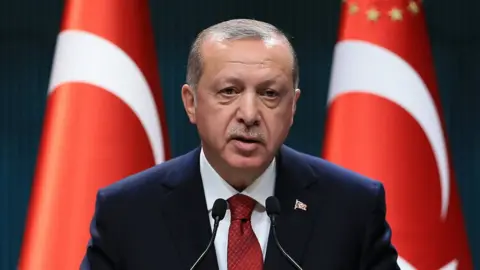Turkey's President Erdogan calls snap election in June
 EPA
EPATurkey will hold snap presidential and parliamentary elections on 24 June, brought forward by President Recep Tayyip Erdogan from November 2019.
He has run Turkey since 2002 and will seek five more years with beefed up powers approved in a referendum last year.
The idea of an early poll was initially proposed by nationalist allies.
Mr Erdogan said in televised speech the country needed the new election to rid it of "the diseases of the old system".
"Developments in Syria and elsewhere have made it urgent to switch to the new executive system in order to take steps for our country's future in a stronger way," the president said in a live broadcast.
Mr Erdogan said he had made the decision after speaking to the head of the nationalist MHP party, Devlet Bahceli, who is expected to form an alliance with Mr Erdogan's ruling AK Party in the parliamentary polls.

Why the rush?
Mark Lowen, BBC Turkey correspondent
This was a carefully choreographed dance.
After repeatedly ruling out early elections, the government wheeled out its coalition partner on Tuesday to make a U-turn, before staging a "discussion" on Wednesday and confirming a date even earlier than expected.
So why the rush? Cynics would say President Erdogan is trying to clip the wings of his main rival, Meral Aksener, who formed a new right-wing party just months ago.
And with the Turkish lira having reached record lows this year - it's the world's worst performing emerging-markets currency - a yawning current account deficit and stubbornly high inflation, Mr Erdogan possibly wanted to pre-empt any economic crash.
His supporters say he simply wants to bring clarity after last year's referendum to change Turkey from a parliamentary to a presidential republic.
The benefits are clear: ride the wave of nationalism after the recent military offensive against Kurdish fighters in Syria and catch the opposition off guard.
But the risk is that some voters will see it as a ploy and will punish a government for economic pain that's already biting.

The constitutional changes, which the Turkish people narrowly backed in last year's referendum, include the abolition of the prime minister, whose powers would be assumed by an executive president.
The extended powers will only take effect after the presidential election.
The accelerated timetable also means Turkey will be voting under the state of emergency imposed since the failed coup in July 2016 which attempted to oust President Erdogan.

Meral Aksener, whose new nationalist Iyi (Good) Party split from Mr Bahceli's MHP to protest his alliance with Mr Erdogan, said hers was the "most prepared party" and announced she would stand for the presidency by collecting 100,000 signatures.
The opposition also welcomed the president's announcement. "Bring it on," said Bulent Tezcan, a spokesperson for the Republican People's Party (CHP).
Mr Tezcan said the country's state of emergency needed to be lifted immediately. "There cannot be an election under emergency rule. The country needs to be brought out of the emergency rule regime starting today."
